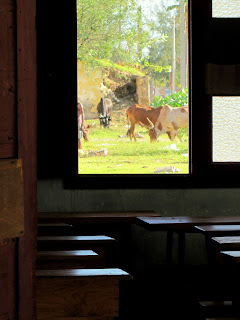 |
This picture may appear to be 'just a group of Students' - but it's much more!
These groups are exploring what it will take to integrate the best in evidence
towards the goal of offering all Malagasy Students - the best in education!
What evolutionary science is showing us - is how to design the most
cooperative, learning-enabled classroom groups possible! |
Evolution shows us that
Life is Groups of Groups.... That is - the biological
cell is 'merely' -or perhaps rather -
magically - a group of
molecules; an
organ is a group of biological
cells; an
organism is a group of
organs- and a
society is a group of
organisms
Clearly to say that Life is 'merely' groups of groups - is disingenuine. The group-stuff of Life must be the most carefully cooperative group-stuff - in the Universe! A cooperation utterly contingent on the
design elements found at every scale!
As our 10-day - EvoS seminar for our Secondary Education Teacher Training Program was coming to an end - we decided to turn
our group's newly found deep-time eyes towards the potentially murky abyss that is
Educational Design.
- How do our Classroom Groups function?
- How can we redesign Classroom Environments to support Students in the organization of effective learning groups (from the micro-level of the neuron; to the macro-level of culture)?
A group of learners - that is - learning in ways that connect their neurons to their culture; their ancestral past to their anticipated futures!
These are the big questions and tall aims my Students have chosen to tackle. To take on a
Service-Learning Project - in which they become the Educational Design engineers for the future of Madagascar!
Armed with our
Unified Human Sciences (UHS) framework; and an expanding literature review of educational best practices - the next offering from
EvoS@UoT is going to kick things up a notch! In this coming round - our Level II Educational Psychology Students will explore Positive Psychology - and the Human traits of optimum well-being. They will examine these traits from across the
UHS spectrum (asking evolutionary questions at multiple scales of time and space) - and from this study - they will re-engineer the
Mythic Minds - introductory course they just completed; and that their incoming Freshman colleagues are about to begin!
 |
As our Students are exploring what the Regents Academy
Experiment was all about - they are experiencing a
radically new style of education;
& they are being empowered to bring these lessons to the
larger University of Toliara community! |
From our studying of educational
Best Practices - we are seeing that Humans have, what scientists call; an
Environment of Evolutionary Adaptedness - or what we can think of in lay terms as an environment to which our genetics are best able to thrive in. This may have BIG implications for education - and luckily these implications are simply re-confirming what many educators already know!
From our studying of David Sloan Wilson's work in creating the
Regents Academy Experiment; we began to glimpse how converging evidence is leading educators to a growing list of best practices in the classroom.
For millions of years our ancestors learned in
very different environments than those imposed by the "Factory Model" of education - as so eloquently described in the video belo, by Sir Ken Robinson. In these varying
Environments of Evolutionary Adaptedness learning environments had some basic common traits:
- We learned in small groups of mixed ages and skill ranges
- Our learning was focused on practical, experiential learning, based on the needs of our communities
- Finding a personal niche - based on one's individual strengths - a niche that is beneficial to one's community; would have been a prized virtue
Our modern day
Service-Learning model, indeed, offers a clear package of
best practices for our Teachers-in-Training to bring back these ancestral traits into our future classrooms. We will practice what we preach - using the
Service-Learning model to understand, and ultimately re-engineer our own educational system in ways that honor our ancestry and prepare us for the future!
In our
EvoS-Inspired classroom we are evolving some most interesting varieties of Student Groups. These varieties are empowered with a rigorous evidential literacy, a sense of exploratory awe befitting of anyone wishing to study the miraculous web that is
Unified Human Sciences -
and - a call to action; a call to improve the very educational communities in which they study and work!
For More Information:
The Regents Academy Experiment at the Evolution Institute
The KIDS Consortium for Service-Learning; far and away the best in the business for making these kinds of projects work!
The good folks over at
George Lucas' Foundation EduTopia also get it! Their evidence-based Core Concepts perfectly reflect our approach - and provide yet another platform for our Students to re-conceive what education can be!













